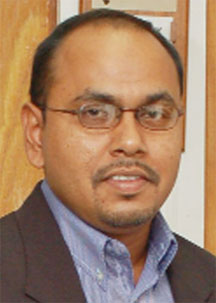A senior local private sector official has told Stabroek Business that government’s handling of the economy this year must include measures aimed at broadening the tax net to ensure that the large numbers of self-employed persons who have been able to evade taxes are no longer able to do so.
Chandradat Chintamani, who holds the office of treasurer with both the Private Sector Commission (PSC) and the Georgetown Chamber of Commerce and Industry (GCCI), said in a television interview earlier this week that while the Guyana Revenue Authority (GRA) may well have met and even exceeded its target for revenue collection last year, “this does not mean that we can remain indifferent to the fact that the tax collection regime still does not embrace large numbers of people who should be making such payments.” Asked to estimate the amounts in such taxes that are yet to be mopped up by the GRA Chintamani said that while his own estimate may be “off target” he believes the figure may well be in the region of three to four billion dollars. “You only have to look at the level of activity that is going on in some industries like gold and construction to become aware of the extent to which businesses are liable to the GRA. We know that the GRA’s revenue-collection regime is probably not efficient enough to detect all of those who drop out of the net,” Chintamani said.
The senior private sector official who, up until recently, served as Chief Executive Officer of Demerara Tobacco Company told Stabroek Business he believed the GRA should invest some of the revenue being garnered to enhance the current collection system. “Part of the problem would appear to be that the present mechanisms are probably not adequate for them to undertake any significant expansion of collection system,” Chintamani said.

The private sector official told Stabroek Business that increased tax collection targeting some private business operations which, up until now, may well have managed to evade taxes altogether could pave the way for a reduction in the taxes being paid by wage earners. “If the collection system is improved we may well be able to reduce income taxes by as much as 20 per cent and still remain ahead of the game as far as collection targets are concerned,” Chintamani said.
Meanwhile, according to Chintamani, issues relating to revenue collection by the National Insurance Scheme are also a matter of concern. Up to last year the scheme had put outstanding contributions from local businesses and self-employed persons at more than $500 million while an NIS official had told this newspaper late last year that the scheme had been able to make no real headway in the collection of the outstanding amounts. Apart from official NIS complaints regarding the sloth of the legal system in expediting cases in which the scheme moves to the courts against defaulters, an official of the organisation told this newspaper that “people with influence know where to go if they are desirous of finding ways of evading the payment of their NIS employee contributions.”




